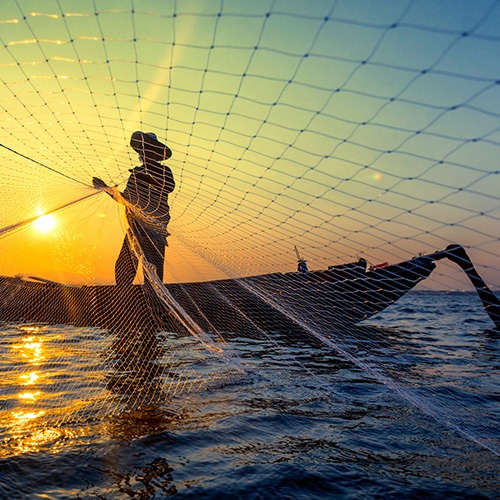Australia leads the world in sales of tuna with the globally recognised MSC blue fish tick, accounting for 24% of worldwide sales. More than 13,000 tonnes of MSC-labelled tuna were sold in Australia in 2018/19, up from just over 5,000 tonnes in 2015/16. [i]
Worldwide, more than 54,000 tonnes of tuna were sold with blue fish tick in 2018/19, compared with 21,500 tonnes in 2015/16. The figures for 2019/20 are expected to be even higher.[ii]
The rapid increase in sales of MSC labelled sustainable tuna is the result of transformations within the fishing sector. 28% of global tuna catch is now certified to the MSC’s standards for sustainable fishing, compared with 14% in 2014. These changes have been driven by increasing retailer and consumer demand.
With the coronavirus pandemic leading to a recent surge in demand for canned tuna*, the MSC is urging both seafood producers and seafood lovers to continue their commitment to sustainable tuna. Published to mark World Tuna Day on Saturday 2 May, the MSC’s Sustainable Tuna Handbook provides a comprehensive guide to sourcing sustainable tuna.
Bill Holden, the MSC’s global tuna expert, said: “Over the past few months, many families have been unable to visit or see the ocean – an inspiration and wonder to us all. But the good news is, that even in these difficult times, consumers can continue to make a difference by choosing sustainably sourced seafood.
"Although tuna is one of the world’s most widely consumed and popular fish, the reality is that around a third of tuna stocks remain in a fragile state. By buying tuna with the MSC blue fish tick, shoppers are playing their part in ensuring tuna stocks are secured for future generations.”
Shifts in global tuna production
The volume of tuna caught to the MSC’s globally recognised standard for sustainable fishing more than doubled from 700,000 tonnes in 2014 to 1.4 million tonnes in September 2019. There are now 29 MSC certified tuna fisheries worldwide, compared with just 8 in September 2014.This includes the Australian Eastern Tuna and Billfish Fishery certification currently held by Walker Seafoods, based in Mooloolaba, Queensland. Walker Seafoods was the first Australian tuna fishing company to achieve certification to the MSC Fisheries Standard in 2015 for its albacore, yellowfin tuna, and swordfish.
These fisheries operate to globally recognised best practices for fishing sustainably, minimising their impact on the environment. They also continue to deliver improvements to safeguard tuna stocks and protect important marine species such as sharks, rays and turtles.
Building on the growing market demand for MSC certified tuna, Tuna Australia entered its member boats within the Australian Eastern Tuna and Billfish Fishery into assessment against the MSC Fisheries Standard in August 2019, with funding support from Parks Australia. If successful, Tuna Australia’s certification would increase the volume of certified sustainable tuna caught in Australia more than fivefold, to over 4,500 tonnes, and expand the scope of the certification to include bigeye tuna.
Behind these changes are more than 200 companies which trade MSC certified sustainable tuna sold in 41 countries. This includes global multi-nationals responsible for some of the world’s largest tuna brands including Australia’s own John West, owned by Simplot, to independent retailers like The Fish Shoppe in Melbourne.
Steven Adolf, the author of the recently published book, Tuna Wars said: “The surge in popularity of tuna at the end of the last century, either in sushi or in cans, has resulted in a steep growth in the global tuna catch, unsustainable practices and illegal fishing. Due to the ongoing COVID-19 crisis, the need for healthy and safe proteins will only increase, adding to the pressure on our global tuna stocks. Many challenges lie ahead, but fortunately, an increasing number of fishers, retailers and brands are making bold commitments to achieve MSC certification. We must not lose this positive momentum.’’
The importance of sustainable tuna to us all
As well as providing a high protein, low-fat, versatile way of eating fish as part of a healthy diet, tuna has a huge social and economic value. The global tuna market is worth more than US$42 billion a year. More than 6 million people are employed within the tuna industry in the Asia-Pacific region alone.Globally 65% of tuna stocks are considered to be in a healthy state, with 17.5% overfished and a further 17.5% at an intermediate level.
[i] This has been driven by Simplot sourcing certified sustainable skipjack tuna for its John West brand from the PNA tuna fishery, which achieved certification to the MSC Fisheries Standard in 2011. The PNA (Parties to the Nauru Agreement) is a group of 8 Pacific island nations: Federated States of Micronesia, Kiribati, Marshall Islands, Nauru, Palau, Papua New Guinea, Solomon Islands and Tuvalu. See pages 64-65 of the Sustainable Tuna Handbook for a case study of the PNA fishery.
[ii] The MSC receives data on the sales of MSC labelled seafood from license holders on a quarterly basis, usually with a one to three-month delay. Therefore the 2019/20 data is not complete, but quarterly figures to date are tracking higher than 2018/19.


